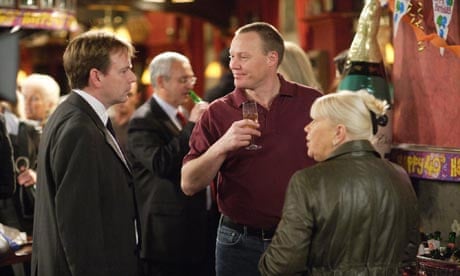"Nah, Emmerdale's rubbish … Corrie's the best … yeah, what about that wedding … OK, but nothing beats EastEnders; that Dot Cotton, she should get a gong."
The yoof outside my local shop are anticipating the British Soap Awards. As far as the real estate is concerned, soap is the real thing. It belongs to us. More than that; for those of us working with young people around the estate, soap is curriculum. Their encounter with serious issues of gender, race, domestics, whatever has been contaminated by the red-top slogans of consumer culture. They cannot handle the immediacy of dialectic.
"How do you feel about homosexuality?" would meet with derision, or worse, the suspicion that you are either accusing or propositioning them. Or it would smack of the classroom and these kids don't "do" lessons. But if the issue is presented at arm's length, a charade, other people's business – "What about those two blokes snogging on East Emmer Street?" – they relax and join in.
Soap is a cognitive lubricant; its vocabulary may be crude but its analysis of the meat of life is of the abattoir. Soap facilitates street engagement with social issues; its dramas are true classics. Discussion of their content may lack the cachet of the South Bank Show but it reaches the parts which such intellectual fare does not.
But it goes further, because soap is not simply a utensil for dialogue with the excluded. It is true theatre. EastEnders is in direct line from Aeschylus. Indeed there is an argument to be made that soap's real life companions – Oprah, Jeremy Kyle et al – draw an equally direct line from the dialogues of Socrates, but that's best left to another time.
What is beyond dispute from a real estate perspective is that soap is as critical in empowering the demos as Euripides was in civilising the Hellenist elite – and more humane. Remember: the Greeks would have replaced the actress with a stand-in, walk-on, knock-down slave to ensure realism when Danielle got fatally smacked by Janine's hot rod. Snuff was a classical invention.
It is unlikely that the cultural commentariat will express the same enthusiasm as shopfront youth for the Soap Awards junket. For them, it is mass media and inherently downmarket. This is a territorial reflex. They are worried that the ramparts of mystique by which the literati have traditionally guarded their elite libraries will be breached by accessible digests, that the hitherto illiterati may engage with ideas which disturb the conclusions of insulated intellectualism. Historically the hommes serieux of the establishment have ever bad-mouthed popular culture with a distinct gender bias – poets as effeminate, the working class literature of the 60s as "kitchen sink", and TV drama as soap, all implying a below-stairs disqualification. The language is no accident.
In reality, soap is theatrically profound, with as much drama as any spat between Zeus and Hera, Dido and Aeneas, Petruchio and Kate; their contemporaries may have names like Kaff, Pat and Woy and drop their aitches, but don't be deceived, their situations are every bit as embattled and heroic.
This is profoundly subversive. When extra-marital humping against a back street wall is shown to be no different in its motivation, permutation and conception than adultery on Olympian cloud or masonic mattress, then there's nothing special – or permissible – about the affairs of the rich and the regal.
These self-appointed grandees have treated history as autobiography, giving themselves the best lines and promoting thereby the myth that for experience to be significant, let alone profound, the sufferer must be elevated. Soap's offence is to contradict this. By publishing the heroism of ordinary life, soap announces the communality of human crisis; tragedy is the same whether in ghetto or palace.
Soap has discredited the grand narrative of the great, good and godly, and authorised the street script of the lost, last and least. Its authors may not yet have acquired full literacy, but in time they will challenge the premise which confines the scarlet of hubris and nemesis to the celebrati, while the lumpen have to make do with the monochrome of put-down and pay-back. Soap washes away that distinction, to show the technicolour of all our lives.

Comments (…)
Sign in or create your Guardian account to join the discussion